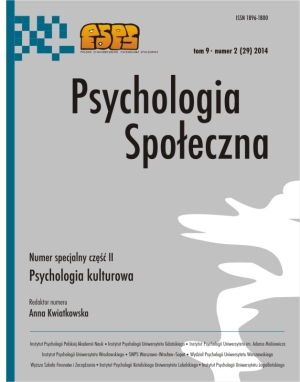Porównywalność danych sondażowych zebranych w różnych krajach
Comparability of survey data collected in different countries
Author(s): Jerzy Wierzbiński, Grażyna Wieczorkowska-Wierzbińska, Anna Olga KuźmińskaSubject(s): Psychology
Published by: Wydawnictwo Naukowe Scholar Sp. z o.o.
Keywords: measurement equivalence; response style; don’t know response; extreme response style; cross- -cultural survey research; ISSP; false respondents
Summary/Abstract: The incomparability of data collected in different countries is a major hindrance to cross-cultural research. We have focused our paper on the issues of measurement and sampling equivalence, as well as response styles manifested in the differences in the numbers of respondents choosing (i) „don’t know” and (ii) extreme responses, e.g. “defi nitely yes” or “defi nitely no”. To test cross-cultural differences we used an Italian and a Japanese representative internet samples, as well as data collected in both countries as a part of the International Social Survey Programme (1998, 2008). In almost all of the six question sets analysed, Japanese gave fewer extreme responses, as well as more “don’t know” responses than Italians. Results of this comparison are interpreted as an indication of the well known differences in the thinking styles (Nisbett, 2009), which in the Eastern cultures are manifested in the acceptance of contradictions (i.e., good and bad, strong and weak etc., exist in everything), whereas thinking in the Western cultures is guided by the law of excluded middle (i.e., a sentence is either true or false). Our analysis also highlights the necessity of detecting “false respondents,” who answer in a random fashion, and eliminating them from further analyses. Such false respondents are a bigger threat to analytical surveys directed at testing of relationships between variables than is a lack of representativeness of the sample, which is crucial when assessing the distribution of a variable in the population.
Journal: Psychologia Społeczna
- Issue Year: IX/2014
- Issue No: 29
- Page Range: 128-143
- Page Count: 16

